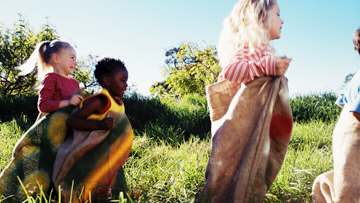Children’s outdoor play is being increasingly recognized as essential for their healthy development. This topic brings to light the benefits of outdoor play in early childhood on physical health, mental well-being, cognitive and social development. It also highlights the need to change the trends, so children can have daily access to outdoor play. This can be done by interventions to reduce parents and practitioners’ fears, more training for practitioners, policy changes and improved urban planning for better environments and natural play spaces.
Synthesis PDF Complete topic PDFInformation sheets
Download the free PDF version here or purchase hardcopy prints from our online store.
Outdoor play
Outdoor play: Hard-wired for nature!

Synthesis
How important is it?
Outdoor play is increasingly recognized as a foundation for children’s healthy development. Children are hard-wired to need nature and to play in their natural environments. Research shows that unstructured play that takes place outdoors is vital to children’s social, emotional, cognitive and physical development.
Yet it seems that children today spend less time engaged in outdoor play compared to previous generations. In fact, more than 56% of children play less than an hour a day outdoors. Caregiver concerns around children’s safety may be one of the biggest barriers to outdoor play. Other factors include the growing presence of screen time in children’s lives, as well as hurried, overscheduled and academically focused lifestyles. Some research suggests that this reduction in opportunities for unstructured outdoor play may already be responsible for declines in creative thinking, reduced ability to get along with others and increased mental disorders.
Climate change, (e.g., extreme temperatures, wildfire smoke, and flooding) can negatively impact outdoor play by making play less safe, reducing access to play, and reducing the quality of play that occurs.
Discussions about the place of the outdoors as a site for young children’s play and learning are now commonplace in reports and publications worldwide. There is also a growing desire among parents and educators to re-engage children with nature.
What do we know?
Studies have found that when children play outdoors, they are more physically active than when they play indoors. Beyond the well-known health benefits of physical activity, research has found that outdoor play and access to green space is associated with higher vitamin D levels, improved mental well-being, better attention and prosocial behaviours, better self-regulation, and improved spatial memory.
Natural environments provide children with more challenge and stress-buffering conditions. Evidence suggests that repeated exposure to high-quality, unstructured outdoor play opportunities has a positive impact on social and cognitive development, including executive functions. This refers to thinking processes such as inhibitory control, working memory and cognitive flexibility. Children’s outdoor play experience in the early years is linked to later academic performance. Playing outside is important for children with disabilities, too. Natural landscapes offer comfort and stimulation. Moreover, contact with a variety of living organisms (plants, animals, insects, bacteria) helps to boost the immune system and may reduce the development of allergies. Exposure to nature may also decrease symptoms of attention deficit disorder. Outdoor play is also linked to greater environmental awareness and connections with nature, and the development of environmental stewardship. Conversely, a lack of outdoor play may undermine children’s concerns for the wider environment.
Despite the benefits of outdoor play, parents around the world report that children today play outside less than previous generations. Children’s access to outdoor spaces may be increasingly limited by risk aversion—a perception that children lack competency to engage with the world alone and are in danger when outside. The general trend is a decrease in children’s opportunities for risk-taking in play. Yet play appears to be an ideal context to develop the ability to handle risk; children who engage in outdoor risky play learn to assess risk in a more accurate way. Evidence also suggests that allowing children a certain level of autonomy strengthens their self-awareness and ability to self-regulate. Risky play might play a role in preventing mental health problems by lowering anxiety and depression symptoms, both in childhood and later in life.
What can be done?
Parents, early childhood educators and other caregivers are the gatekeepers for outdoor play opportunities in early childhood. They should aim to strike balance with scheduled activities, screen time and free time. When working with families, health care professionals should promote outdoor play across settings and weather conditions. Children should be given opportunities outdoors where they can explore the world around them, challenge themselves physically and play with others. Caregivers should try to avoid over-surveillance, which may prevent children from learning to negotiate risk and gaining physical competence.
Ideally, outdoor play should involve changing conditions, like those found in nature, to encourage children to adapt and become flexible. Some educational environments have introduced “loose parts play” onto the playground—large objects with no obvious play purpose. Versatile, complex and flexible play environments can accommodate children’s diverse interests, varied competency and risk tolerance. New models of early childhood outdoor space have emerged in response to the obesity crisis and the children and nature movement. Recommended designs involve flowing and looping pathways, portable and loose part components (wheeled toys, balls and sticks), shade trees and lots of nature.
Because children spend a large part of their time in childcare settings, improved policies may be one way to ensure that young children get more outdoor time. For example, in Canada, while all provincial regulatory bodies mandate daily outdoor play if weather conditions are appropriate, only two provinces specify the frequency or duration. Early learning educators need support to understand their role in outdoor play supervision. Currently, there is a lack of formal education and professional development related to outdoor play. A more cohesive approach to developing and implementing policies, procedures and curriculum as they relate to outdoor play would help to better promote the value of outdoor play. Indigenous philosophies and research may offer a more holistic, balanced approach to developing practices, programs and policies that impact children’s growth and development in outdoor play. When time spent in nature is part of everyday living and learning, it becomes a wide-ranging and inclusive experience.
Finally, neighbourhood planning and design is important. Low traffic volumes, fewer intersections, natural environments, greenness and access to a private yard, other children to play with are all linked to higher levels of outdoor play. Key levers for change are at the municipal level, where such decisions are usually made. Naturalized play areas should also be inclusive, so that children with disabilities and their able-bodied peers and siblings can play together.
Discover more

What are the unique benefits of outdoor play in natural environments?
How children play outdoors is different from their play inside. It tends to be more physically active, children report feeling more freedom while playing outside, and the outdoor environment has the potential of exposing them to natural elements and open air. As a result, the kind of benefits that children experience from outdoor play can be different from indoors.
Children need time to engage in high quality, unstructured outdoor play in natural environments.
Natural environments are ideal to
- help children learn to be more connected with nature and develop a better environmental awareness;
- promote cognitive and social development by providing children with more challenge, changing conditions and stress-buffering conditions.
Outdoor play in natural settings is associated with increased physical activity in young children, which in turn
- boosts their physical health;
- improves their mental well-being;
- improves their attention behaviours, self-regulation, and working memory; and
- can improve their executive functioning.
Clearly, outdoor play should involve changing conditions, such as found in nature, to maintain children’s interest in play, encourage them to adapt, interact with their peers, take risk and test their abilities.
Publications
The Influence of Outdoor Play on Social and Cognitive Development

Resources and bulletins
The Encyclopedia also recommends...
3 key ingredients for supporting children's outdoor play | Dr Mariana Brussoni
Storypark | Mat Time [VIDEO]
ParticipACTION | Report Card on Physical Activity for Children and Youth
This report card is the most comprehensive assessment of child and youth physical activity in Canada.
Position Statement on Active Outdoor Play
Healthy Active Living and Obsesity Research Group
Active outdoor play statement from the Council of Chief Medical Officers of Health
Pan-Canadian Public Health Network
Risk reframing tool for parents, caregivers and educators
Outsideplay.ca | Helping parents, caregivers and educators gain the confidence and skills to support children's outdoor play
Canadian Public Health Association Toolkit for promoting outdoor play
The Global Matrix 4.0 on Physical Activity for Children and Youth
Active Healthy Kids Global Alliance
Declaration on Risk in Play and Learning
International School Grounds Alliance
Tool for designing outdoor educational environments
International Play Association Canada
Promoting the Child’s Right to Play for over 40 years
Play Wales | The national charity for children’s play in Wales








